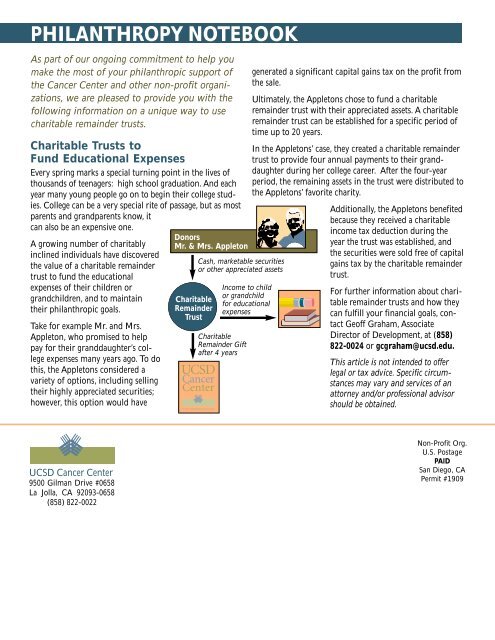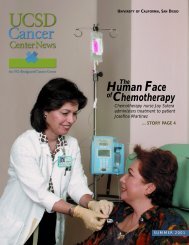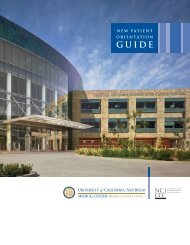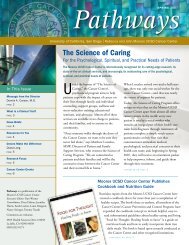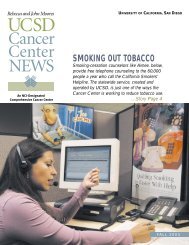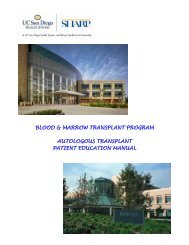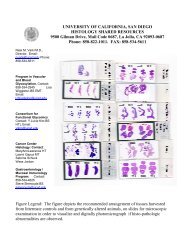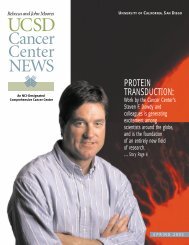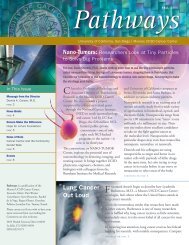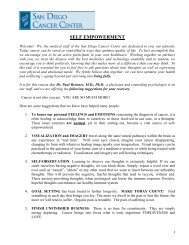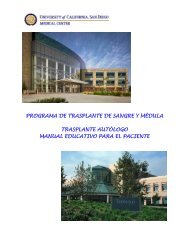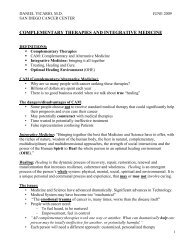FORCANCER - Moores Cancer Center
FORCANCER - Moores Cancer Center
FORCANCER - Moores Cancer Center
You also want an ePaper? Increase the reach of your titles
YUMPU automatically turns print PDFs into web optimized ePapers that Google loves.
PHILANTHROPY NOTEBOOK<br />
As part of our ongoing commitment to help you<br />
make the most of your philanthropic support of<br />
the <strong>Cancer</strong> <strong>Center</strong> and other non-profit organizations,<br />
we are pleased to provide you with the<br />
following information on a unique way to use<br />
charitable remainder trusts.<br />
Charitable Trusts to<br />
Fund Educational Expenses<br />
Every spring marks a special turning point in the lives of<br />
thousands of teenagers: high school graduation. And each<br />
year many young people go on to begin their college studies.<br />
College can be a very special rite of passage, but as most<br />
parents and grandparents know, it<br />
can also be an expensive one.<br />
A growing number of charitably<br />
inclined individuals have discovered<br />
the value of a charitable remainder<br />
trust to fund the educational<br />
expenses of their children or<br />
grandchildren, and to maintain<br />
their philanthropic goals.<br />
Take for example Mr. and Mrs.<br />
Appleton, who promised to help<br />
pay for their granddaughter’s college<br />
expenses many years ago. To do<br />
this, the Appletons considered a<br />
variety of options, including selling<br />
their highly appreciated securities;<br />
however, this option would have<br />
Donors<br />
Mr. & Mrs. Appleton<br />
Charitable<br />
Remainder<br />
Trust<br />
Cash, marketable securities<br />
or other appreciated assets<br />
Income to child<br />
or grandchild<br />
for educational<br />
expenses<br />
Charitable<br />
Remainder Gift<br />
after 4 years<br />
generated a significant capital gains tax on the profit from<br />
the sale.<br />
Ultimately, the Appletons chose to fund a charitable<br />
remainder trust with their appreciated assets. A charitable<br />
remainder trust can be established for a specific period of<br />
time up to 20 years.<br />
In the Appletons’ case, they created a charitable remainder<br />
trust to provide four annual payments to their granddaughter<br />
during her college career. After the four-year<br />
period, the remaining assets in the trust were distributed to<br />
the Appletons’ favorite charity.<br />
Additionally, the Appletons benefited<br />
because they received a charitable<br />
income tax deduction during the<br />
year the trust was established, and<br />
the securities were sold free of capital<br />
gains tax by the charitable remainder<br />
trust.<br />
For further information about charitable<br />
remainder trusts and how they<br />
can fulfill your financial goals, contact<br />
Geoff Graham, Associate<br />
Director of Development, at (858)<br />
822-0024 or gcgraham@ucsd.edu.<br />
This article is not intended to offer<br />
legal or tax advice. Specific circumstances<br />
may vary and services of an<br />
attorney and/or professional advisor<br />
should be obtained.<br />
UCSD <strong>Cancer</strong> <strong>Center</strong><br />
9500 Gilman Drive #0658<br />
La Jolla, CA 92093-0658<br />
(858) 822-0022<br />
Non-Profit Org.<br />
U.S. Postage<br />
PAID<br />
San Diego, CA<br />
Permit #1909


